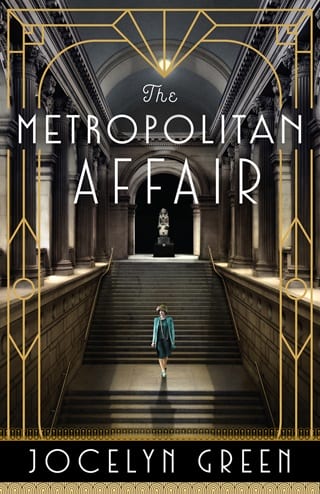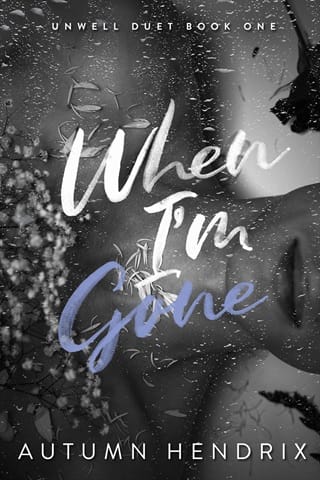Chapter 25
CHAPTER 25
MONDAY, DECEMBER 28, 1925
D r. Westlake!"
On the steps of the Metropolitan Museum of Art, Lauren turned to find Daniel DeVries looking as though he were being chased. A stab of alarm shot through her.
"Good grief, Dr. DeVries, is everything all right?" With a clutch of dread, she added, "Have you heard from my father?"
"Yes." He'd caught up to her now, slightly out of breath. "Let's go inside."
She hastened to lead him downstairs and into her office. If something had happened to him ... She shuddered as their most recent conversation played in her mind. She prayed it wouldn't be their last.
"Is he hurt?" she asked, hanging her hat and coat on the tree behind her door.
"No." Dr. DeVries took the chair across from her desk and set his hat on his knee. "At least, not physically. He told me about the dreadful mistake in the newsletter. I'm here to accept all blame. Your father is guiltless."
She blinked in surprise, then sat in her own chair. "When did you speak with him? I've been calling his apartment, but no one has answered. I expected he'd be back from Newport by now."
"He sent a telegram, which I only received late last night, since I've been out of town myself. Apparently he's in Newport for the next few days, but the phone lines at the Napoleon House are down. Or being replaced or some such." He threw up his hands. "If it's not one thing, it's another. At least the roof has been fully replaced."
"Already?"
"A miracle, I know. Now I beg for another one: your forgiveness. The article's attribution is entirely my fault. Well, my secretary's fault, but as I am his supervisor, I should have caught the mistake before it went to print. Your father submitted the article with its proper byline. He even wrote up a short bio for you on a separate piece of paper and paper clipped it to the manuscript. Unfortunately, somehow that bio became separated from your article submission, and when my secretary scanned the name ‘Dr. Lauren Westlake' at the top, he simply assumed your father had written it. You must admit it's an easy mistake to make, however unfortunate. A correction is already planned for the next issue. Beyond that, what else can I do to assure you we meant no harm? And that your father, in particular, ought to be exonerated?"
Shock and regret rolled over her in waves. "I don't know what to say." Every word she'd spewed at her father came back to her. It hadn't been his fault at all. But influenced by the story in Dr. Breasted's letter—on a subject Dad had ordered her not to pursue—she'd assumed he was guilty. She was wrong. They both ran this time, away from each other.
"I could drag my secretary in here to corroborate my story."
"No, that's all right," she mumbled. "I'm glad you came. I—I see how the mistake could have happened. Thank you for running the correction."
"Dare I hope this hasn't ended your series for us, which has only just begun?"
Lauren's mind spun. "I'll submit more articles," she said in a daze.
"Wonderful." He leaned back in his chair, exhaling through a grin. "What a relief. By the way, Agnes and I would like to invite you and your father to join us at the Hotel Astor for a late dinner on New Year's Eve. We could stay until midnight for a rooftop-view of the ball dropping from the Times Tower."
Lauren stood. "Yes, Dr. DeVries. Count on it." For this one holiday, she and her father would be together. She pulled on her hat. "And now if you'll excuse me, I have a train to catch."
———
That afternoon, Lauren was in Newport, knocking on the door of the Napoleon House. She'd talked to Mr. Robinson about taking time off and had called Joe to tell him her plans. She'd also asked a neighbor to feed Cleo, since her roommates were still gone. Now all she had to do was fix the mess she'd made of things with her father.
She knocked harder.
The door opened, and Dad's eyes went wide.
"Dad," she said and could not go on.
With a watery smile, he enveloped her in an embrace. She could not remember the last time he'd hugged her. She shook with silent sobs as she wrapped her arms around his middle. "I'm sorry," she said. "Dr. DeVries told me everything this morning. Forgive me," she begged. "Please, please forgive me. I said such horrible things to you. I should have let you try to explain. I should have—"
"Shh. There, there." He patted her on the back as though she were still a child, when in reality, with these heels, she was taller than he was. "All is forgiven." Standing back, he glanced at the valise and hamper she'd dropped on the porch. "You're staying the night?"
"If you'll have me."
"Nothing would please me more." His thin hair was disheveled, his clothes rumpled. He looked old, a bit fragile, but entirely relieved.
She felt the same.
That night, instead of going into town for dinner, they ate from the hamper a meal of bread, cheese, grapes, and prosciutto. Since the dining room of the old house had been turned into a gallery, Lawrence took a blanket from the cot in his office and spread it on the floor. With candles and firelight instead of the chandelier, it felt like a winter picnic. A cold dinner had never tasted so sweet.
"I'll never do that again, Dad," she said above the popping fire. "I'll never assume the worst of your intentions." This was the third time she'd done that since her birthday.
"I appreciate that. I'll try harder to convince you of the truth next time you're ... misguided."
She wasn't just misguided, she was wrong. "Here, I have something for you." It was a peace offering, a Christmas gift, and a gesture of good faith, all in one. Pulling her valise closer, she unlatched the buckle and withdrew another article for the Napoleon Herald , this one about the plaster statues of Horus that Vincent Escalante molded and painted to look like wooden carvings.
Lawrence accepted it with a smile that seemed to relax his entire body. "You could have submitted this directly to Dr. DeVries this morning when you saw him. He's the editor, and the one all submissions go to."
"I wanted to give it to you." Surely it wasn't lost on him that this was an act of trust. "The byline mistake wasn't your fault. I see no need to circumvent you. Besides, you may want to recommend some corrections to this draft before passing it along anyway."
Tipping the paper toward the candlelight, he read, his thin lips slanted. "Are you open to a bit of constructive criticism, dear?"
"If I've made a mistake, by all means, I'd like to correct it."
"You're not wrong. It's just that here you state that a forged carving made from plaster would be easily discovered if it is scratched or if it chips or breaks."
That was true. "A scratch, chip, or break would show the integrity of the piece inside. Plaster will be white. If a piece is truly wooden, it won't be as fragile anyway."
A deep laugh rumbled in her father's chest, and she nearly forgot that she was the one with a PhD in Egyptology. "Yes, darling, but can you imagine what a suspicious reader will do with this line? They'll take it as a suggestion that they ought to take their antiquity and bang it against the wall to see what color it is inside."
"Surely your readers are more discerning than that."
"You'd be surprised. I predict that at least a handful of our subscribers will misconstrue your words and end up damaging genuine antiques. Then we could have a lawsuit on our hands, and even if the Napoleon Society would win, we can't afford the legal fees." He gestured to the surrounding darkness as if she needed a reminder that restoring the house into a museum was costing them enough. "So let's avoid all of that by simply omitting that line. Leave the focus on signs that are easier to detect, such as these seams you talk about, a result of anything being molded rather than carved."
She agreed to his suggestion. "Those seams are such a telltale sign. It's amazing the clues people miss."
"It's not so amazing when you think about it," Dad said. "People see what they want to see. If they believe a piece is real, they won't even think to look for things like that. That's why your articles are so important."
Quiet settled into the space around them as they exchanged stories of how they'd spent their holiday. "You'll never guess what Joe's father gave his mother for Christmas," she said at length. "A wooden carving of a horse and rider from his new Napoleon Society membership."
"Is that right? And was she pleased?" Dad layered another slice of prosciutto atop a thick wedge of bread and cheese.
"Oh, very." Lauren described the scene and told him about the tour of the Met that followed their Christmas dinner. "Sal and Greta said it was their best Christmas in many years."
With a deep breath, she told him about Joe's gift to her. "Now all I need are dark glasses and the right shoes."
"Our expedition leaves in September," he said. "You'll ask for the time off soon?"
That seemed premature. "Not before my participation is approved by the board."
"I have no doubt it will be."
Familiar resistance stirred in Lauren, a form of self-protection, she supposed, against having her hopes raised and dashed again. Why else would she not share Dad's excitement? Why else would she not be moved by the anticipation of a lifelong dream coming true?
Logs shifted in the fireplace. Flames bobbed and nodded, then began to gutter. Lauren rose and crossed to the hearth, added more wood, then watched to make sure the fire caught. The house was beautiful, but with these high ceilings, a challenge to keep warm. No wonder the previous owners mostly used it in the summer.
"We do have central heating installed now," Lawrence told her, "but I can't justify heating the entire mansion when I'm the only one here. Or even when it's just the two of us. You don't mind, do you? It's like we're camping."
She held her hands to the warmth of the gathering flames. "I don't mind it."
"Do you remember the last time we spent a night under the same roof?" he asked from where he remained seated on the floor.
"I've been trying to recall that very thing," she told him.
"August 27, 1907. You were fourteen years old, and so desperate for my stories you insisted on staying up all night long to hear them over again."
Ah yes. But Lauren remembered it differently. It wasn't his stories she was desperate for but him. "You caught the train to New York the next day. You were leaving for Egypt again."
"That's right. I didn't mind staying up with you, though. I could sleep on the train. I'm sure I did."
Lauren, however, had fallen asleep in school three times the next day. It had been worth it for those extra hours with her father. But she did wonder now how Mother must have felt, lying alone in their bed. Had she waited for him to come to her for their last night together before another months-long separation? How many hours passed before she realized he wasn't coming? Had she cried herself to sleep?
Had she been jealous of the time Lauren had taken with Lawrence? Angry?
I'm losing both of you , Mother had written in one of her letters. Guilt needled Lauren for keeping Dad's attention all for herself.
"Clarke needed me." The irony of Lawrence's statement jarred Lauren. If anyone had needed him, it hadn't been Theodore Clarke.
"I thought you didn't want to talk about him," she said quietly.
"You need to know this about Clarke. He styled himself a great archaeologist, but what was his background? Banking. Finance. He knew nothing about excavation. If I hadn't guided his decisions, he never would have dug where he did in the Valley of the Kings. He never would have made those landmark discoveries that made him famous."
The first time Lauren had heard this story, she'd believed him. But Clarke's pioneering methods had been famous for decades. She'd learned in graduate school that he was the one who'd made a grid of the Valley and hired men to systematically work through it, long before Howard Carter picked up where Clarke had left off, famously discovering King Tut's tomb.
She crossed her arms and stared vacantly at the fire. Sparks lifted from the flames, flying erratically before turning to ash. The floor-to-ceiling windows on either side of the fireplace were bare of any coverings. Angled as they were, Lauren caught her reflection as she stood there, centered in the tall pane. Then a spark appeared at her shoulder, and she slapped at it before realizing the orange glow came from outside.
Strange.
"Do you have neighbors, Dad?" she asked. "I saw a light outside, maybe a cigarette being lit. I thought we were quite secluded in this location, but is there a gazebo or house out there that I can't see?"
He sucked in a breath. "Come away from the windows," he said.
 Fullepub
Fullepub 



